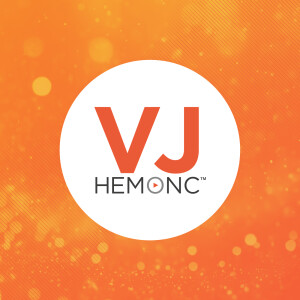
75.2K
Downloads
318
Episodes
The Video Journal of Hematology and Hematological Oncology (VJHemOnc) podcast covers the latest hematological oncology and hematology news from international experts – from leukemias, lymphomas, MDS and MPNs, to sickle cell, aplastic anemia and rare diseases. Made for healthcare professionals and researchers, we are a global, independent, open-access platform. Listen to the latest news, including cutting-edge trial updates, controversies and opinion. If you enjoy the podcast, please leave us a rating and review! For more news visit www.vjhemonc.com
The Video Journal of Hematology and Hematological Oncology (VJHemOnc) podcast covers the latest hematological oncology and hematology news from international experts – from leukemias, lymphomas, MDS and MPNs, to sickle cell, aplastic anemia and rare diseases. Made for healthcare professionals and researchers, we are a global, independent, open-access platform. Listen to the latest news, including cutting-edge trial updates, controversies and opinion. If you enjoy the podcast, please leave us a rating and review! For more news visit www.vjhemonc.com
Episodes

Wednesday Nov 02, 2022
The role of the innate immune system in MDS
Wednesday Nov 02, 2022
Wednesday Nov 02, 2022
Myelodysplastic syndromes (MDS) represent a heterogeneous group of diseases which remain a challenge to treat, and immune dysregulation has been found to play a key role in the pathogenesis of MDS. There is a growing interest, by researchers, as well as clinicians, to better understand the role of the innate immune system in this disease, and further investigate novel agents and strategies to treat patients at an earlier stage.
In this podcast, you will hear from leading experts Rafael Bejar, MD, PhD, University of California San Diego, San Diego, CA, Rashmi Kanagal-Shamanna, MD, The University of Texas MD Anderson Cancer Center, Houston, TX, and David Sallman, MD, Moffitt Cancer Center, Tampa, FL, who discuss the role of the innate immune system in MDS, and further highlight the role of chronic inflammation in this disease, as well as future therapeutic strategies.

Friday Oct 28, 2022
iwAL 2022 Session I: The standard of care in AML in 2022
Friday Oct 28, 2022
Friday Oct 28, 2022
The 4th International Workshop on Acute Leukemias (iwAL) 2022 took
place in Nice, France, and brought together leading experts in the field as
they discussed several topics. In this podcast series, you will hear the
latest updates in acute myeloid leukemia (AML) and acute lymphoblastic
leukemia (ALL) and gain an insight into the sessions that took place at this
year’s meeting.
The first session from iwAL focused on the standard of care in AML in
2022. In this podcast, Mark Levis, MD, PhD, Johns Hopkins Sidney Kimmel
Comprehensive Cancer Center, Baltimore, MD, Eunice Wang, MD, Roswell
Park Comprehensive Cancer Center, Buffalo, NY, Jessica Altman, MD,
Robert H. Lurie Comprehensive Cancer Center, Northwestern University,
Chicago, IL, and Charles Craddock, CBE, FRCP, FRCPath, DPhil, University
of Birmingham, Birmingham, UK, discuss and debate the current standard
of care in AML in 2022, commenting on the role of transplantation and
novel agents, as well as treatment approaches for relapsed FLT3-mutated
disease.

Wednesday Oct 26, 2022
iwNHL 2022 Session I: Advances in the treatment of T-cell lymphoma
Wednesday Oct 26, 2022
Wednesday Oct 26, 2022
The 19th International Workshop on Non-Hodgkin Lymphoma (iwNHL) 2022 took place in Barcelona, Spain, and brought together leading experts in the field as they discussed several topics. In this podcast series, you will hear the latest updates in NHL and gain an insight into the sessions that took place at this year's meeting.
The first session from iwNHL focused on advances in the treatment and management of T-cell lymphoma. In this podcast, Laurence de Leval, MD, PhD, Lausanne University Hospital, Lausanne, Switzerland, Steven Horwitz, MD, PhD, Memorial Sloan-Kettering Cancer Center, New York, NY, François Lemonnier, MD, Henri Mondor University Hospital, Créteil, France, and David Sibon, MD, PhD, Henri Mondor University Hospital, Créteil, France, discuss the safety and efficacy of brentuximab vedotin in enteropathy-associated T-cell lymphomas (EATL), epigenetic drugs and TRBC1-directed CAR-T therapy in T-cell lymphoma, and novel developments in the field of cutaneous T-cell lymphoma (CTCL).

Friday Oct 21, 2022
ISA 2022: meeting highlights and recent updates in amyloidosis
Friday Oct 21, 2022
Friday Oct 21, 2022
The 18th Meeting of the International Society of Amyloidosis (ISA) was held in Heidelberg, Germany, on 4-8 September, 2022. This meeting brought together experts in amyloidosis as they discussed the latest updates in the field, including novel therapeutic approaches, clinical trial updates, and recent advances in the diagnosis and management of this disease.
In this exclusive podcast, you will hear from experts Shaji Kumar, MD, Mayo Clinic, Rochester, MN, and Ashutosh Wechalekar, MBBS, MD, FRCP, FRCPath, DM, University College London, London, UK, as they share their highlights from this year's meeting. Topics covered in this podcast include the evolution of diagnostic approaches in light chain (AL) amyloidosis, advances in imaging techniques, and the role of hematopoietic stem cell transplantation (HSCT) in the era of daratumumab-based therapies.

Thursday Oct 13, 2022
Thursday Oct 13, 2022
The 19th International Myeloma Society (IMS) Annual Meeting was held in Los Angeles, CA, and brought together experts in the field, who discussed several fascinating topics, including novel treatment strategies in multiple myeloma, the prognostic value of measurable residual disease (MRD), managing patients with high-risk disease, and more.
In this exclusive podcast, Charlotte Pawlyn, BA, MBBChir, MRCP, PhD, FRCPath, The Institute of Cancer Research and The Royal Marsden NHS Foundation Trust, London, UK, and Rakesh Popat, BSc, MBBS, MRCP, FRCPath, PhD, University College London Hospitals NHS Foundation Trust, London, UK, hold a fascinating discussion on the management of high-risk patients, highlighting data from several UK clinical trials. The experts also discuss the prognostic value of MRD and its application in clinical practice, the management of frail patients, and further comment on the recent approval of teclistamab by the European Medicines Agency (EMA).

Friday Oct 07, 2022
Friday Oct 07, 2022
The 2022 Texas MPN Workshop was held in San Antonio, TX, and covered several fascinating topics in the field of myeloproliferative neoplasms (MPNs). MPNs represent a heterogeneous group of diseases that remain a challenge to diagnose and treat. Several experts agree that early intervention and better understanding disease progression are crucial aspects to consider when treating patients, and studies investigating this are underway.
In this exclusive podcast, you will hear from experts Andrew Kuykendall, MD, H. Lee Moffitt Cancer Center, Tampa, FL, and Angela Fleischman, MD, PhD, University of California Irvine, Irvine, CA, as they share some insights into disease progression in MPNs, the importance of early intervention, and future targets.

Thursday Sep 29, 2022
iwMDS 2022: Key highlights
Thursday Sep 29, 2022
Thursday Sep 29, 2022
The 1st International Workshop on Myelodysplastic Syndromes (iwMDS) 2022 was held in Miami, FL, and brought together leading experts in MDS who discussed the latest updates in the field. Several fascinating topics were covered at this year's meeting, including immune dysregulation and targeting in MDS, improving the efficiency of drug approvals, treating high-risk disease, and more.
In this podcast, Amer Zeidan, MBBS, Yale School of Medicine, New Haven, CT, Rena Buckstein, MD, FRCPC, Sunnybrook Health Sciences Centre, Toronto, Canada, and Valeria Santini, MD, University of Florence, Florence, Italy, share key highlights from this year's workshop. The experts comment on the importance of improving clinical trial design and therapeutic options for patients, as well challenges in the field.

Thursday Sep 22, 2022
Identifying high-risk myeloma and improving treatment strategies in these patients
Thursday Sep 22, 2022
Thursday Sep 22, 2022
Multiple myeloma is a heterogeneous disease, and despite recent advances in therapeutic agents, several patients still relapse after therapy and have poor survival outcomes. The identification of high-risk features, including the presence of del(17p) and t(4;14), are crucial for improving diagnosis and outcomes for these patients.
In this podcast, Heinz Ludwig, MD, Wilhelminen Cancer Research Institute, Wilhelminenspital, Vienna, Austria, and Meral Beksac, MD, Ankara University, Ankara, Turkey, hold a fascinating discussion on identifying high-risk myeloma patients, and parameters that can be used to define high-risk disease. The experts also comment on treatment strategies for this patient population, emphasizing the promise of CAR-T therapy and bispecific antibodies. This discussion took place at the 19th International Myeloma Society (IMS) Annual Meeting held in Los Angeles, CA.

Wednesday Sep 14, 2022
Improving the efficiency of drug approvals in MDS
Wednesday Sep 14, 2022
Wednesday Sep 14, 2022
In recent years, the treatment and management of myelodysplastic syndromes (MDS) has improved, and several clinical trials are investigating novel combinations and agents with the aim of providing more options for patients. Due to the heterogeneity of this disease, there are several challenges with treating MDS, and a need to improve the availability of therapeutic agents.
In this podcast, leading experts Hetty Carraway, MD, Cleveland Clinic, Cleveland, OH, Justin Taylor, MD, Sylvester Comprehensive Cancer Center, Miami, FL, Andrew Brunner, MD, Massachusetts General Hospital, Boston, MA, and Olatoyosi Odenike, MD, UChicago Medicine, Chicago, IL, share their thoughts on how to improve the efficiency of drug approvals in MDS. The experts cover several interesting topics, including the challenges associated with treating high-risk disease, novel targets of interest, and more. This discussion took place at the 1st International Workshop on Myelodysplastic Syndromes (iwMDS) held in Miami, FL.

Friday Sep 09, 2022
Highlights from the 2022 Texas MPN Workshop: advances in MPN treatment
Friday Sep 09, 2022
Friday Sep 09, 2022
Myeloproliferative neoplasms (MPNs) represent a group of rare and heterogeneous diseases which remain a challenge to treat. Several advances have been made in recent years, both in the diagnosis and treatment of MPNs. The 2022 Annual Texas MPN Workshop brought together leading experts in the field, who discussed current and future treatment strategies, ongoing clinical trials, and future outlooks.
In this exclusive podcast, leading experts Ruben Mesa, MD, UT Health San Antonio MD Anderson Cancer Center, San Antonio, TX, and Naveen Pemmaraju, MD, The University of Texas MD Anderson Cancer Center, Houston, TX, share key updates in the treatment and management of essential thrombocythemia (ET), polycythemia vera (PV), and myelofibrosis (MF), and more highlights from this year's meeting.
